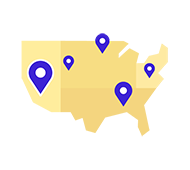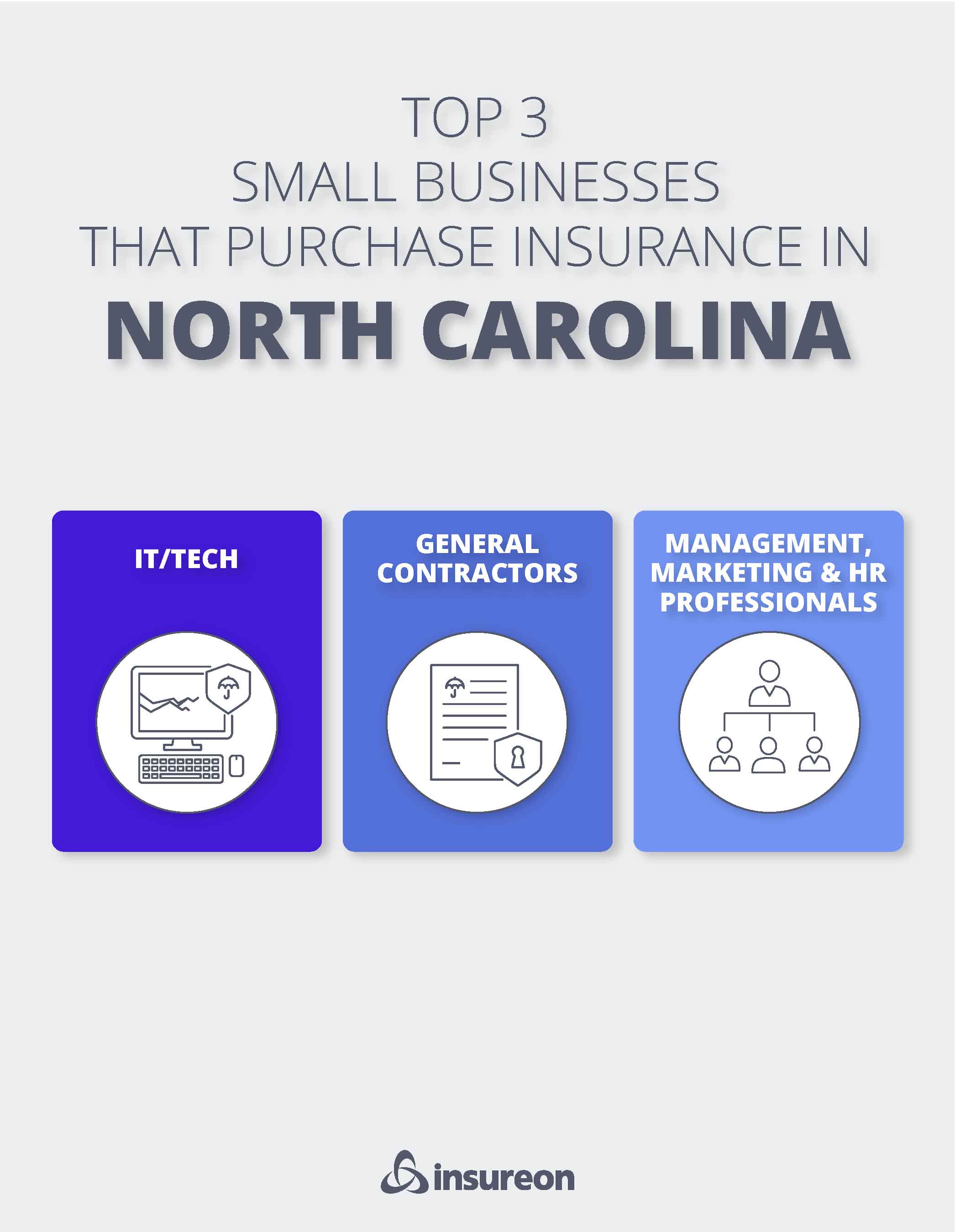
Get the right commercial insurance for your North Carolina business


Which policies are recommended for North Carolina businesses?
Small businesses in North Carolina most often buy these types of insurance.
General liability insurance
This type of business liability insurance is important for all North Carolina businesses. A general liability policy covers common third-party risks and it's required by most commercial leases.
- Customer bodily injuries
- Damaged customer property
- Libel and other advertising injuries
Workers’ compensation insurance
Businesses in North Carolina that employ three or more people are required to carry workers’ comp. It also protects sole proprietors from work injury costs that health insurance might deny.
- Employee medical expenses
- Disability benefits
- Legal fees from employee injuries
Commercial auto insurance
This policy is required for business-owned vehicles in North Carolina. It covers injuries and property damage in an accident, along with vehicle theft and other types of damage.
- Accidents involving business vehicles
- Theft of a commercial vehicle
- Damage to a company vehicle
Business owner’s policy
A BOP bundles commercial property insurance and general liability coverage in one plan. It's often the most cost-effective type of commercial insurance for a North Carolina business.
- Customer injuries
- Damaged customer property
- Damaged business property
Professional liability insurance
This policy, also called errors and omissions insurance (E&O), protects North Carolina businesses that provide professional services or advice. It covers lawsuits related to work performance.
- Work mistakes and oversights
- Professional negligence lawsuits
- Late or incomplete work
Errors and omissions insurance
E&O, sometimes called professional liability insurance, is common with professional services in North Carolina. It can cover the cost of lawsuits related to your work performance.
- Missed deadlines
- Accusations of negligence
- Errors and oversights
Cyber insurance
This policy covers financial losses from data breaches and cyberattacks. It's recommended for North Carolina businesses that handle credit card numbers and other sensitive data.
- Customer notification expenses
- Fraud monitoring services
- Data breach investigations
Commercial umbrella insurance
Umbrella insurance boosts coverage on your general liability insurance, commercial auto insurance, and employer's liability insurance when the underlying policy reaches its limit.
- Customer lawsuits
- Auto accident lawsuits
- Employee injury lawsuits
Commercial property insurance
This policy covers the value of a business's physical structure and its contents, such as inventory, equipment, and furniture. Bundle it with general liability coverage in a BOP for savings.
- Fire
- Theft and vandalism
- Weather damage
Verified business insurance reviews
Hear from customers like you who purchased small business insurance.
Which business insurance policies are required in North Carolina?
State laws affect which business insurance coverage you need. These policies are required everywhere in North Carolina, from Charlotte to Raleigh.
Workers' compensation insurance
North Carolina state law requires workers’ comp insurance for all businesses that employ three or more individuals, full-time or part-time.
This business insurance policy covers medical bills for work-related injuries and illnesses. It also provides disability benefits to injured North Carolina workers, and protects employers from liability over an injury.
Commercial auto insurance
All business-owned vehicles in North Carolina must be covered by commercial auto insurance. This policy covers the cost of accidents involving work vehicles.
North Carolina’s minimum requirements for auto liability insurance (and uninsured motorist coverage) are:
- $30,000 bodily injury liability per person
- $60,000 bodily injury liability per accident
- $25,000 property damage liability
Trucking companies may need additional coverage to comply with regulations.
Though it's not required, personal vehicles driven for work purposes should be covered by hired and non-owned auto insurance (HNOA), as personal auto policies usually exclude business use. It can be added to commercial general liability insurance or a business owner's policy.
How much does small business insurance cost in NC?

Commercial insurance can be affordable for small business owners in Charlotte, Raleigh, and elsewhere in the state.
Average costs in North Carolina are:
General liability: $42 per month
Workers' comp: $52 per month
Professional liability/E&O: $62 per month
Factors that influence business insurance costs include:
- Your industry and risks, such as a restaurant or law firm
- Business operations
- Number of employees
- Policy limits and deductibles

FAQs about North Carolina business insurance
How do I get a certificate of insurance for my business?
Insureon's licensed agents can help you find policies that fulfill North Carolina's requirements and protect against financial loss. Once you've purchased insurance with us, you can download a certificate of insurance (COI) by logging into your account.
Can my company be held liable for a data security breach?
Yes – that's why cyber insurance is so crucial. Small businesses are a common target of cyberattacks since they often have fewer security measures in place.
North Carolina's data breach laws require businesses to report security breaches to affected residents, and the costs can escalate quickly. Cyber liability insurance lessens the financial impact by paying for notification costs, legal fees, and fines.
Does my industry affect state business insurance requirements?
Yes, your state may have special requirements for business insurance and bonds for your industry. You may also need a license depending on the work you do.
General contractors, some handymen, and construction professions often need to carry general liability insurance or surety bonds to perform certain types of work. Having the right insurance and bonds helps you comply with state licensing requirements.
Real estate agents and brokers and other professionals who offer advice or services sometimes need professional liability insurance, also called errors and omissions insurance (E&O), to get licensed in their state.
Note that cities and counties may have their own laws, in addition to state laws.
How can I save money on North Carolina small business insurance?
As with any purchase, shopping around is one of the best ways to find an affordable option. With Insureon, you can compare business insurance quotes from top-rated providers by filling out a free online application.
Other ways to save include bundling insurance products for a discount and choosing less expensive policy options, such as lower limits or a higher deductible. Learn more about how to find cheap business insurance.
































